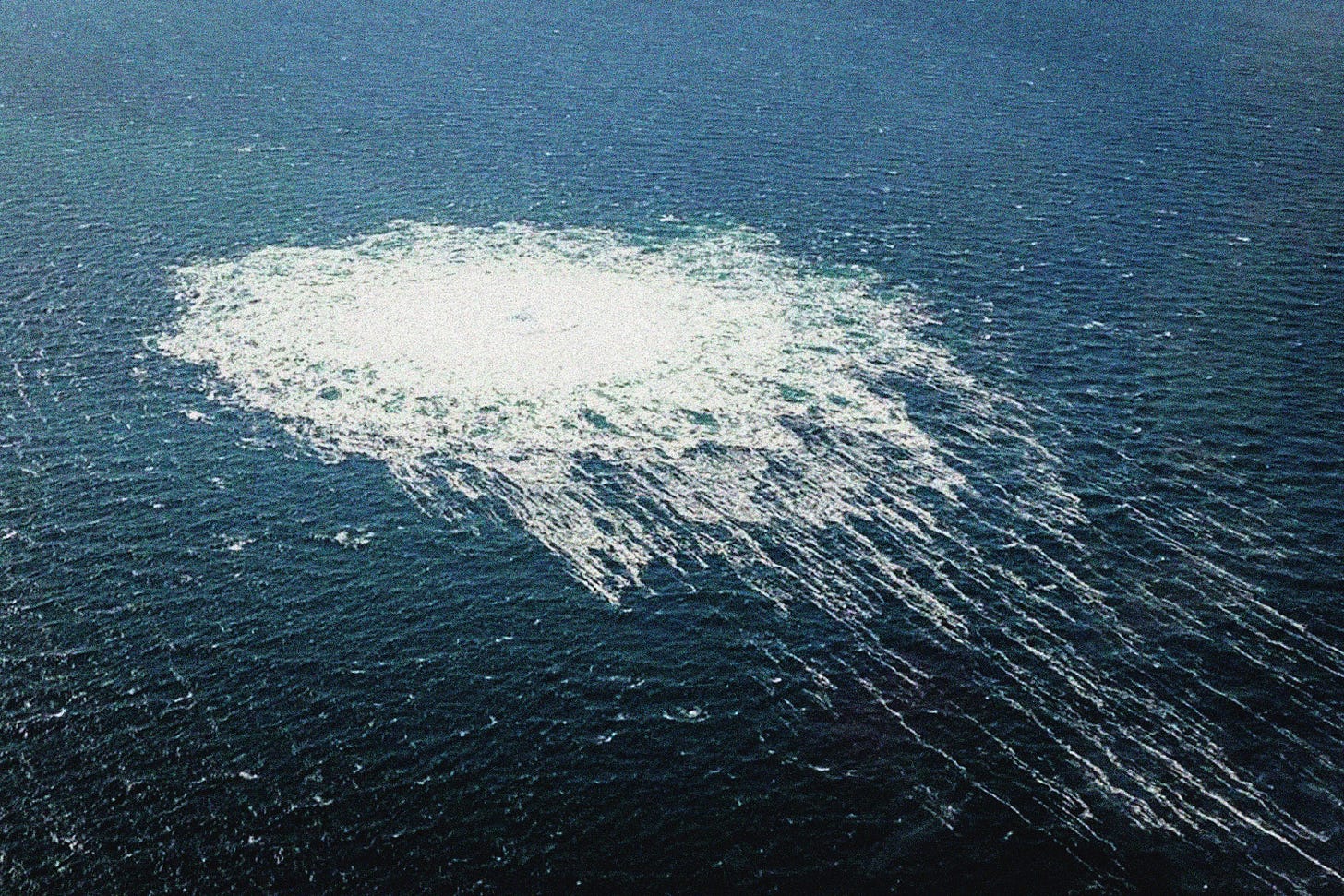Weekend Miscellany
Economic Warfare, Finland, and Nordstream
An Economic Warfare Council for the US?
There’s an article today at Foreign Policy on the need to create an “Economic War Council” on China, with the impressive clickbait-style subtitle “If Washington wants peace in Asia, it must prepare for financial war.”1 The article itself is more measured than the headline, but if this is an indicator of how China policy is trending, then we’re nowhere near hitting bottom yet.
The main thrust of the argument is the authors’ contention that the United States needs to think more strategically about its use of the economic weapon, building a planning committee that can advise on potential uses of economic statecraft and build consensus for multilateral action in advance of crisis situations.

I’m definitely on board with advance planning of these issues. And there are two specific areas where I strongly agree with the authors:
Sanctions didn’t deter Putin from invading Ukraine precisely because they weren’t made clear before the invasion. This is the gaping hole at the center of every argument that the US failed to deter Russia in Ukraine. Frankly, back in February 2022, no one know how far the West would be willing to go in sanctioning Russia or transitioning from Russian gas. Like many observers, if you’d told me at that time how draconian the eventual sanctions would be, I would not have believed you; it just did not fit with the prior cautious way in which Europe in particularly had approached sanctions. We can debate why things shifted so fast , but the bottom line here is that doubt does not make for good deterrence.
The creation of a centralized entity within the US government that can explore the potential downsides of future sanctions and their unintended effects could be hugely valuable, especially if it took the scenario-style approach that military planners often employ. Advance planning for a variety of contingencies could be a really helpful tool in helping us avoid self-inflicted economic wounds like the rise in gas prices we saw last summer as world oil markets struggled mightily to manage the sudden disruptions of US and EU sanctions on Russian oil.
At the same time, the article is more broadly problematic in a few ways.
First, as some of the literature on “weaponized interdependence” suggests, there’s a widespread assumption in US policy circles that aggressive use of US economic statecraft will not necessarily degrade America’s centrality in global markets. That’s certainly one possible outcome. Indeed, it has been proven accurate in prior cases when sanctions have been imposed on more marginal actors in the international system. European banks and companies, for example, chose to divest from Iran rather than risk the Trump administration’s retribution.
But it’s equally possible that this assumption is incorrect when it comes to more central actors, and that America’s choice to weaponize our trade and finance ties to China could end up undermining our economic position more broadly. The article seems to suggest that advance coordination can overcome disagreements about whether to ‘decouple’ from China (or ‘derisk,’ as some would put it). But even America’s closest European allies are wary of calls for trade decoupling; how would the rest of the world react to an “us or them” choice from the United States?

Second, the article has an interesting note on the use of sanctions for the attrition of military power, arguing that:
The sad reality is that the sanctions came too late to make a big difference in the current war, though they will undoubtedly constrain Putin’s ability to fulfill his imperial dreams moving forward. Attritional sanctions would have been far more useful before Putin decided to invade Ukraine, throwing a wrench into Russia’s military modernization program years before Putin ordered the tanks to cross Ukraine’s border.
The lesson for China policy is that it will be too late to apply attritional sanctions after Xi has decided to invade Taiwan. The Biden administration seems to understand this, based on the sweeping export controls it imposed on China’s semiconductor industry last October. But despite their ambitions, these moves were limited to a single foundational technology. The hard reality is that if Washington is serious about degrading China’s military capacity, it will need to widen its aim beyond a handful of high-tech components—painful as that might be for U.S. investors and businesses that have grown accustomed to reliance on China.
This implies a much broader decoupling from China than the narrow tech-based ‘strategic decoupling’ arguments of recent years. Indeed, it implies a shift away from trade with China generally, not something concentrated only in certain sectors. The last sentence alludes to the potential domestic business such a step could produce. But I think it underestimates it. In addition, there are new reports that China is considering barring some kinds of rare earth mineral exports to the United States in response to the last set of semiconductor restrictions.
If this article is any indication, the debate is no longer whether the United States should engage in strategic decoupling in key sectors, but rather whether a wholesale divestment from China is needed.
It’s hard to overstate how significant a reversal this would be to US economic policy in general — and it is being driven at least partly by presumed foreign policy interests. It was the norm in recent decades to be relatively free-trade minded in US foreign policy circles — or at least not to bother too much about a relatively liberal trade consensus while focusing on other issues. But foreign policy debates are now helping to drive the United States towards a position as an anti-trade actor globally.
I’m not convinced we’ve thought through the long-term ramifications of killing the golden goose of American overseas economic engagement.
A few good reads on this from recent weeks:
Adam Posen, Foreign Policy, America’s Zero-Sum Economics Doesn’t Add Up
Michael Spence, CFR, Destructive Decoupling
Hank Paulson, Foreign Affairs, America’s China Policy is Not Working
Finland Joins NATO
I have two pieces out on Finland’s accession to NATO, which took place at the start of this week. One is in the LA Times, and the other is my regular debate column (It’s Debatable!) with Matthew Kroenig at Foreign Policy.
I’ve taken a special interest in this case, because it has been a highly unusual case of NATO expansion, at least in recent years. Finland and Sweden are reasonably well integrated with the alliance already; they’re European Union members; and they are advanced, industrialized democracies with well-developed militaries. That puts them at odds with almost all of the candidates proposed for NATO membership in the last fifteen years, which were smaller or poorer countries like Georgia, Macedonia, or Bosnia.
The Finns in particular also bring a long and fascinating history of neutrality and self-defense that contrasts strongly with many of the Eastern European states that joined NATO after the Cold War, bringing little in the way of military capacity or even inclination. At a minimum, this suggests Finland is less likely to become a burden on the alliance — or on the United States. But it certainly brings new strategic problems, particularly the addition of 800 new miles of NATO-Russia border. Finnish membership in NATO brings the alliance to within a few hours drive of St. Petersburg.
Then there’s the issue of European defense more broadly. As I wrote in the LA Times:
It’s worth noting that NATO has a history of substituting expansion for genuine problem-solving. Indeed, for the two decades following the collapse of the Soviet Union, NATO’s leaders punted on questions about the alliance’s future, its purpose and its military capabilities in favor of a focus on expansion to include the nations of Eastern Europe. Until at least 2008, debates about expansion were a central focus of many of the alliance’s summits.
It seems that NATO’s leaders may be returning to form, focusing on expansion in lieu of solving the actual tough questions in European security. This is particularly problematic as things appear to have stalled out after all the hope and promise of the Zeitenwende.
So let’s give a warm welcome to Finland, our newest ally, but bear in mind that they aren’t going to solve our transatlantic defense dilemmas.
Good takes on this:
Max Bergman and Sophia Besch, Foreign Affairs, Why European Defense Still Depends on America
Chris Preble, Zack Cooper, and Melanie Marlowe, War on the Rocks Net Assessment, Better Burden-Sharing with Allies
Jeremy Shapiro and Jana Puglierin, ECFR, The Art of Vassalization
The War in Ukraine is Getting Murkier
And finally, there are few new, interesting stories coming out of the press on the spooky side of the Ukraine ledger. The first of these is a potential leak of information related to Ukraine’s long awaited spring offensive. The plans - which apparently came from some strange corners of the Internet - appear to be bad photos of slides from a briefing at the Pentagon in early March. They reveal some information on the disposition of Ukrainian forces, along with casualty figures, but are fairly out-of-date and nonspecific. The waters have been further muddied by the fact that a poorly-photoshopped version of the slides has also been circulating, trying to claim that Russian casualties are lower - and Ukrainian ones higher - than the original.
There’s very little of interest here to us (although Russian military planners will undoubtedly glean some nuggets of useful information). But with very little other information emerging from the battlefront in recent weeks, it’s no surprise that news sources jumped on this.
Second, and at the risk of sticking my fingers in a hornet nest, there have been a few news stories on the more interesting and potentially explosive story of what happened to Nord Stream.

These stories are notable not because they tell us who blew up the pipeline, but because they suggest that Western intelligence services aren’t looking too closely at this question. Indeed, our understanding of the issue hasn’t advanced much beyond what we could have discerned in September from a simple assessment of means, motives, and opportunity.
In a nutshell: the Russians may be the most likely to commit this kind of sabotage, but had little to gain from taking Nord Stream out of commission permanently. And despite the conspiracy-theorizing to the contrary. it’s hard to imagine the cautious, measured Biden administration engaging in such a flagrantly illegal and ill-conceived action. And all of the other options - the Ukrainians, the Eastern Europeans, or even non state actors linked to Ukrainian oligarchs - are problematic from the point of view of alliance management.
We can’t infer from these stories whether Western intelligence isn’t looking further because they know there’s something they won’t like, or whether they’re just scared they’ll find something they won’t like if they keep looking. Regardless, it’s not a good look for Western intelligence services to be quoted in the press, even anonymously, saying they don’t intend to solve this one.
Other Good Reads of the Week
Tim Sweijs and Mike Mazarr, War on the Rocks, Mind the Middle Powers
Franz-Stefan Gady, Foreign Policy, Why Neutrality is Obsolete in the 21st Century
Rose Gottemoeller, Texas National Security Review, The Role of U.S. Diplomacy in Countering Russia’s Nuclear Threats and Misbehavior
Kelly Grieco, War on the Rocks, In Defense of Denial: Why Deterring China Requires New Airpower Thinking
And Last, But Not Least: Happy Easter!
No offense intended. I ❤️ my editors at Foreign Policy, and we all need to pay the bills. Even if it’s with clickbait.



"Sanctions didn’t deter Putin from invading Ukraine precisely because they weren’t made clear before the invasion."
The sanctions were not made clear because the war was entirely intentional on the part of the United States.
I think Emma should spend more time studying what Russia or China, or India, or Iran have to say and not listen to the echo chamber that is Washington DC.
A good source of critical thinking and sanity is represented by the nakedcapitalism.com run by Yves Smith, Lambert et co. And the many many readers and commentators that sustain materially and spiritually/emotionally/intellectually the site, the community.